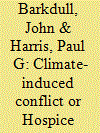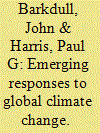| Srl | Item |
| 1 |
ID:
139224


|
|
|
|
|
| Summary/Abstract |
What are the implications of global climate change for peace and human welfare in the future? The answer depends on the actual effects of climate change and how the world responds to them. Current economic and political systems are unlikely to produce the policy and institutional changes needed to reduce adequately the greenhouse gas (GHG) emissions causing the problem, so some of the most dangerous effects of climate change could occur this century. Some observers posit that climate change will result in catastrophe, but specifics of this catastrophe range widely. Does climate change mean painful but manageable social disruption, requiring, for instance, populations to move and cities to be rebuilt? Or does climate change portend much worse, including major wars, the end of modern civilization or, incredibly, even the eventual extinction of humanity? If these more severe consequences are likely or possible, what kind of global society would be best able to survive, or at least cope? The answer may be found in eco-socialism and a ‘Hospice Earth’ that nurtures people and societies regardless of how bad the future becomes.
|
|
|
|
|
|
|
|
|
|
|
|
|
|
|
|
| 2 |
ID:
169168


|
|
|
|
|
| Summary/Abstract |
Ecosystem-based adaptation (EbA) has recently emerged as an important way to address the impacts of climate change. EbA suggests that harnessing ecosystem services can help communities adapt to climate change, thereby limiting threats to social systems and human security. What are the arguments for and against EbA? Who favours EbA? What does EbA mean in practice? What are the limits to EbA as global average temperature rises? Reviewing documents of non-governmental organisations, governments, intergovernmental organisations and scholars helps answer these and related questions. As climate change results in increasing challenges for society, the more important all forms of adaptation, including EbA, will become. Yet, while useful and appropriate in certain contexts, EbA might not be sufficient if climate disruption becomes severe, which would require consideration of a transformational change in global institutions and practices.
|
|
|
|
|
|
|
|
|
|
|
|
|
|
|
|
| 3 |
ID:
017937


|
|
|
|
|
| Publication |
Nov 2000.
|
| Description |
361-366
|
|
|
|
|
|
|
|
|
|
|
|
|
|
|
|